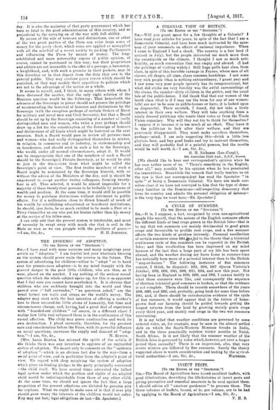THE EPIDEMIC OF ADOPTION.
[To me EDITOR or rne "Seecreroa."1 51a,-1 have rend with some surprise and many misgivings your article on "Adoption." I am fearfol lest your wholesale blessing en the system rhould prove quite the reverse in the future. The system of advertising for children—either to " adopt " or to hand over for promiscuous adoption—is to my mind fraught with the gravest danger to the poor little children, who are thus, as it were, placed on the market. I say nothing of the serious moral question which the whole subject opens -up, for this is so apparent that I feel sure you cannot have overlooked it. It is obvious that ehildren who are recklessly brought into the world and then passed over (" full surrender," " no questions asked," are the usual terms) are waifs and strays on the world's mercy. The adopter may start with the best intention of offering a mother's love to these uncared-for little atoms of humanity, but time and circumstances change, end, having.had a great deal of experience with " hoarded-out children " (of course, in a different class) I realize how little real safeguard there is in the continuance of this casual affection. The child may prove unattractive and work its own destruction. 1 plead earnestly, therefore, for the greatest tare and consideration before the Press, with its powerful influence on social questions, increases the supply and demand of " adop- [Mrs, Louis Buxton has misread the spirit of the article if she thinks there was any intention to approve of an unguarded eystem of adoption. We meant only to comment on the "epidemic of adoption "—which is an obvious fact due to the war—from a social point of view, and in particular from the adopter's point of view. We regard with deep misgiving the eystem of adoption which gives no binding pledges to the party principally concerned —the child itself. We have several times advocated the fullest legal system under which the position and rights of an adopted child would be indistinguishable from those of any other child. At the same time, we should not ignore the fact that a large proportion of the present adoptions are dictated by genuine pity for orphans. What we ought to make sure of is that if ever pity should grow weary the interests of the children would not seer. Pity may not last; legal obligations do last. —ED. Spectator.]


























 Previous page
Previous page